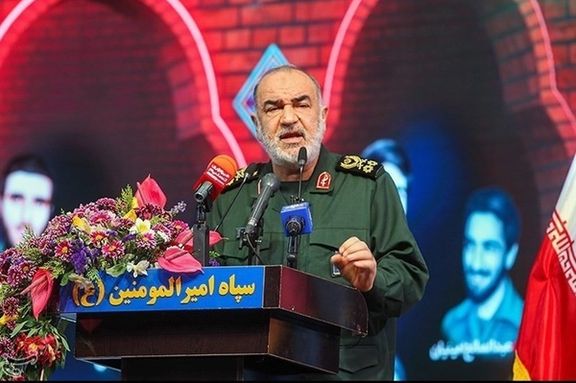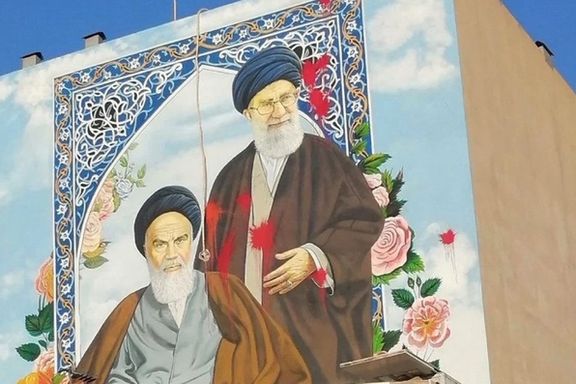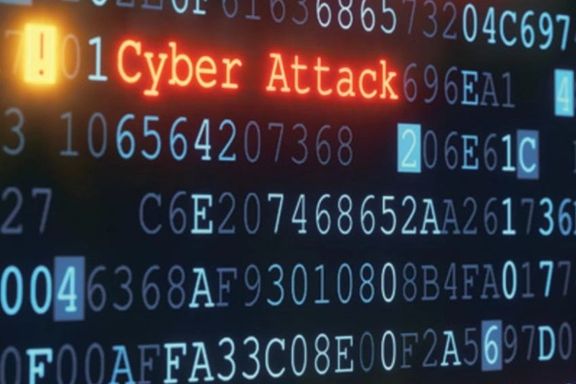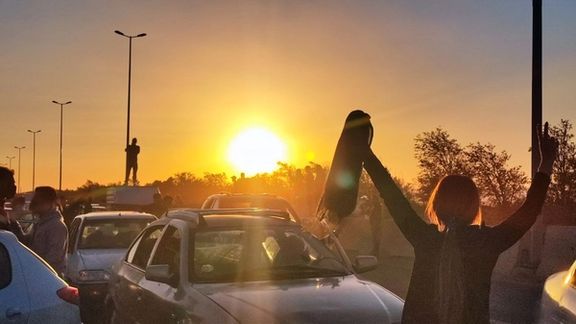IRGC Chief Threatens ‘Enemies’ With Revenge Over Iran Protests

Commander of Iran’s Revolutionary Guard Hossein Salami has threatened “the Islamic Republic’s enemies” with revenge for their “interventionist and mischievous actions.”

Commander of Iran’s Revolutionary Guard Hossein Salami has threatened “the Islamic Republic’s enemies” with revenge for their “interventionist and mischievous actions.”
On the sidelines of the state-sponsored rallies to commemorate the anniversary of the occupation of the US embassy in Tehran in November 1979 and taking dozens of Americans hostage for 444 days, Salami said, “the enemies know that we will definitely respond to their interventionist and mischievous actions, but now we cannot say where and how we will do that.”
Using the term “Enemies” is a favorite of Supreme Leader Ali Khamenei to refer to the United States, Israel, US allies in the region and in Europe.
“The enemies that said they were not focusing on the revival of the nuclear deal (JCPOA) have now focused on the domestic issues of the Islamic Republic,” the IRGC chief said. “They are worried that the Islamic Republic may take action against them. Accordingly, they have now retreated into a defensive shell for fear of Iran’s action against them,” he added.
Following Supreme Leader Ali Khamenei’s lead, Iranian officials claim that the ongoing antigovernment protests across Iran – ignited by death in custody of 22-year-old Mahsa Amini -- are instigated by foreign enemies, particularly the US, Israel and some European countries.
On the fourth of November 1979, a group of radical students who were followers of Ayatollah Ruhollah Khomeini stormed the US Embassy in Tehran and took 52 US diplomats and citizens hostage, marking the moment as the start of Iran’s hostage diplomacy. Since then, Iran has detained many dual nationals visiting the country and has used them as bargaining chips against Western countries, human rights organizations have said.

Statements by several Iranian officials lately show that despite often defiant rhetoric, they begin to fear that the Islamic Republic might be nearing its end.
On Thursday, the escalation of unrest in Karaj, Tehran, Amol, Ghazvin, Esfahan and many other Iranian cities took the protests in Iran to a new height and intensity.
Zabihollah Khodaeian, the chairman of State Auditing Organization has said that "Enemies believe the Islamic Republic is finished." Like most other Iranian officials who have signalled their fear that the Islamic Republic's downfall might be near, Khodaeian blamed foreign governments for the uprising although he acknowledged that protests started after a young woman was murdered in mid-September while in police custody.
Although protests continue in tens of Iranian cities every day, Khodaeian claimed that only a handful of people take to the streets to voice their protest against the government. Meanwhile he called on the government to explain the events on social media platforms.
Ultra-conservative Lawmaker Mostafa Mirsalim also admitted that "Some Iranians do not believe in the Guardianship of Supreme Jurisconsult," or the concept of a Supreme Leader, which is the underlying principle of Khamenei's leadership of the Islamic Republic.
Chairman of Iran's Passive Defense Organization Gholamreza Jalali also blamed foreigners for what he called "A five-fold hybrid war" against Iran which he said will soon target the country's oil and energy sector, ANA news agency quoted him as saying. Jalali said that his organization has plans for emergency responses to these threats, as well as thinking of preventive measures.
Blaming the United States, Jalali said the level and scope of these threats are constantly changing. "Oil and energy sector are the first priority for our enemies. Last year's cyber-attack on our fuel distribution website was the first step in the enemy's hybrid war against Iran," Jalali said, adding that his organization is planning a cyber security course for the country's managers in a bid to prevent future cyber-attacks. He added that managers who lack Internet literacy should resign to minimize potential damage.
These attacks, he said, are meant to deal serious blows to the Islamic Republic. He added that cyber-attacks on the petrochemical plants can have far more dangerous implications.
Meanwhile, Gholamreza Soleimani, the commander of Basij militia, has claimed that the ongoing uprising is the outcome "the enemy's" attempt to slow down Iran's successes, however, he did not explain what those successes were. He added that "arrogant powers have always instigated seditions in Iran since a long time ago."
Vice President Amir-Hossein Ghazizadeh Hashemi also opined in interview with Didban Iran website that "The enemy, [a jargon coined by Supreme Leader Ali Khamenei to avoid naming the United States, Israel of Europe] has been working for several hundred years to wipe the Islamic civilization off the world."He said "the enemy's sedition" included bringing the new generation of Iranians into the scene of the struggle against the Islamic Republic.
The only Iranian political figure who did not blame foreigners for the uprising, was senior cleric Ayatollah Abdollah Javadi Amoli, who said in an interview with Shafaq news agency (Shafaqna) that "the inefficiency of some officials has prevented Iran's progress." Meanwhile, in a show of sympathy with the protesters Javadi Amoli said: "Feeding the people is not enough. They also want to live a life marked by dignity." He went further on to say that he respected the protesters "Life, Women, Freedom" slogan.

Australia says cyberattacks by state-sponsored groups from China, Russia and Iran have grown significantly, estimating that one attack occurs every seven minutes.
In a report published on Friday, Prime Minister Anthony Albanese said the Australian Cyber Security Centre (ACSC) received 76,000 cybercrime reports last financial year, up 13 percent from the previous corresponding period.
Describing the attacks as a "huge wake-up call," he said they have made cyberspace a “battleground.” "It's a huge wakeup call, and companies need to get their act together...we need to do much better," he said, adding that "The government has stepped up, the private sector needs to step up in the interest of their customers but also their own interest."
Business losses attributable to cybercrime rose on average 14 percent over the period, with the average crime costing a small business A$39,000 ($24,540).
“It’s not just about the frauds or the texts that you or I might receive, but real issues around the security of our country going forward,” Cybersecurity Minister Clare O’Neil said in reference to the report. “It is a national security focus of the government.”
As part of efforts to intensify reactions to cyber threats by the Islamic Republic, the FBI warned late in October that the Iranian cyber group Emennet Pasargad is conducting hack-and-leak operations involving a combination of hacking and theft of data. In November 2021, the Treasury Department sanctioned six Iranian officials as well as the company for their involvement in the planned cyberattack.

US President Joe Biden on Thursday vowed to "free" Iran and said that protesters who oppose the Islamic Republic would soon succeed in freeing themselves.
"Don't worry, we're gonna free Iran. They’re gonna free themselves pretty soon," Biden said during a wide-ranging campaign speech in California, as dozens of demonstrators gathered outside holding banners supporting Iranian protesters.
Biden did not expand on his remarks or specify what additional actions he would take during the remarks at MiraCosta College near San Diego.
Iran’s President Ebrahim Raisi reacted on Friday during a pro-government rally on the anniversary of the occupation of the US embassy in Tehran in November 1979 that resulted in taking dozens of Americans hostage for 444 days. In harsh anti-US remarks, Raisi said that he came across Biden’s statement “that he might have uttered in a state of wackiness.”
Raisi responded to Biden’s remark saying that “He said standing behind the official podium that they are supposed to free Iran. Mr. President, Iran was freed 43 years ago and vowed not to be enslaved by you.”
Raisi went on to mock US attempts to block Iran’s oil exports, saying that Washington’s plans were defeated. “Today we have influence in the region and no equation can succeed without Iran’s agreement, and America also knows this very well.”
The White House's National Security Council did not immediately respond to a request for comment.
Iranian Americans opposed to the clerical regime in Tehran have viewed the Biden Administration as weak and ready to make deals with Tehran. Before his election in 2020, Biden announced that he would seek to restore the 2015 nuclear deal, known as JCPOA, that his predecessor had abandoned.
Eighteen months of negotiations before the current upheaval started in September failed to produce a result, and Iran even began supplying drones to Russia to use in Ukraine, the administration has said.
Seven weeks of demonstrations in Iran were ignited by the death of a 22-year-old woman, Mahsa Amini, in the custody of Iran's morality police.
The protests triggered by Amini's death on September16 have shown the defiance of many young Iranians in challenging the clerical dictatorship, overcoming fear that has stifled dissent in the wake of the 1979 Islamic Revolution.
Demonstration on Thursday in many cities once again shocked the clerical regime which does not know how to end the nationwide protests that have become a daily occurrence. Its security forces cannot be everywhere at all times and protesters rejecting the whole political system are becoming bolder, attacking police, anti-riot forces and government vigilantes called Basij.
The United States on Wednesday said it will try to remove Iran from the 45-member U.N. Commission on the Status of Women (CSW) over the government's denial of women's rights and brutal crackdown on protests.
Iran is just starting a four-year term on the commission, which meets annually every March and aims to promote gender equality and the empowerment of women.

From early morning Thursday [Nov. 3] turned out to be another phase of Iran protests with several memorial gatherings met with government violence and escalation.
The antigovernment uprising has entered the phase of people mourning those killed in September and October, with Iranians gathering to vent their anger on the 40th day of those killed by security forces.
According to tradition, the 7th and 40th days of people's death are solemn occasions to gather and commemorate their memory. When the departed are victims of injustice, the occasion becomes a more emotional one.
There were these sort of protests in almost ten cities daytime Thursday with more demonstrations expected in the evening.
This is what is taking place almost on daily basis in Iran. While security forces instead of standing aside and allowing these gatherings to turn into protests in cemeteries, they intervene, attack and arrest people, fire their guns and add to the tension.
During these clashes sometimes more people get killed and this fuels a new cycle of protests in the coming days and weeks.
On Thursday citizens of Karaj and Arak held rallies to honor the memory of Hadis Najafi and Mehrshad Shahidi, two young protesters killed by security forces 40 days ago and seven days ago, respectively.
They fired guns and arrested many young people, which will simply intensify the protests.
Below we offered live coverage of events in Iran on November 3. Our coverage ended at 02:00 hour Iran time
----------------------------------------------------------------------------------------------------------------------------
Confrontation in Fuladshahr in Esfahan Province. Two riot police seen on the ground, as they lost consciousness on Thursday.
-----------------------------------------------------------------------------------------------------------------------------
----------------------------------------------------------------------------------------------------------------------------
In Rasht, northern Iran, protesters force the police to retreat through the streets.
----------------------------------------------------------------------------------------------------------------------------
Scattered protesters in Bijar, Kordestan province chanting "death to Khamenei" Thursday night.
----------------------------------------------------------------------------------------------------------------------------
Protests in the eastern Tehran district of Narmak. People chanting against Khamenei for "year of crimes".
----------------------------------------------------------------------------------------------------------------------------
Young protesters marching in central Tehran and chanting, "This year is the year of blood, Seyyed Ali will be gone," referring to Ali Khamenei.
----------------------------------------------------------------------------------------------------------------------------
Another scene from protests in Qazvin, Thursday night.
-----------------------------------------------------------------------------------------------------------------------------
The evening, night time protests well underway in Tehran. Here is crowd in Saadat-Abad district of Tehran.
----------------------------------------------------------------------------------------------------------------------------
People set fire to a large banner of Qasem Soleimani in Qazvin Thursday night. Soleimani was killed in a drone attack in January 2020 in Baghdad ordered by former US President Donald Trump.
----------------------------------------------------------------------------------------------------------------------------
Security forces lined up in Tabriz ready to attack protesters.
----------------------------------------------------------------------------------------------------------------------------
Crowds are getting larger in the working class neighborhood of Naziabad in Tehran Thursday evening. In this video no security forces can be seen.
People beginning to congregate also in Tehran-Pars district.
----------------------------------------------------------------------------------------------------------------------------
For the first time in 43 years people in the city of Fasa, Fars Province, came out to protest Thursday evening.
----------------------------------------------------------------------------------------------------------------------------
In the evening, people in the streets of Bukan, western Iran chant "Death to the dictator."
----------------------------------------------------------------------------------------------------------------------------
A large crowd in Karaj, 20 miles west of Tehran, blocked a major highway during ceremonies honoring the memory of Hadis Najafi. Protesters were chanting, "This year is the year of blood, Seyyed Ali will be gone", referring to Iran's ruler Ali Khamenei.
After security forces fired at protesters, people set fire to a police van in Karaj.
----------------------------------------------------------------------------------------------------------------------------
A large crowd gathered in Esfahan on Thursday to commemorate the 40th day of Mahsa Mogui, a young protester killed in September. They were chanting, "I will the one who killed my sister."
In Fuladshahr, near Esfahan, security forces shot a woman in the head. Her children who were next to her are screaming in the video clip.
-----------------------------------------------------------------------------------------------------------------------------
In Kermanshah, western Iran people commemorated the 40th day of Saeed Mohammadi killing by security forces. They chanted, "Death to the dictator".
-----------------------------------------------------------------------------------------------------------------------------
In Qazvin thousands turned out to honor the memory of Javad Haydari. They were chanting, "IRGC, Basij goons, you are our ISIS", referring to the Sunni Muslim terror group.
-----------------------------------------------------------------------------------------------------------------------------
The 40th day commemoration of a young man, Behnam Layeqpur, in Rasht, northern Iran. People repeating "Death to the dictator".
-----------------------------------------------------------------------------------------------------------------------------

An Australian lawmaker has shown solidarity with Iranians in their fight against clerical rule, saying that the Islamic Republic will face the consequences of mistreating protesters.
Keith Wolahan, a member of Australia’s House of Representatives said in an exclusive interview with Iran International that he will do whatever he can to make the voice of the Iranian community heard.
“The least I can do is to stand there with them and use my voice as their representative to help in any way I can,” noted the Australian official.
The Australian politician read a statement in the house of representative on the fortieth day after the killing of Mahsa Amini to declare solidarity with the people of Iran.
“It's not acceptable and it's not good enough that the regime has a seat on the UN Commission for the Status of Women. It's also not good enough that the officials of the regime can travel freely around the world without consequence when they're trampling on freedoms at home,” Wolahan noted about the goal behind his statement.
“Many of the protesters are not only being killed but are now going to be subject to what can only be described as show trials…There will be consequences for how those people are treated,” he warned.
Wolahan represents the division of Menzies where the largest population of Iranian people are living in Australia.
“I want to make sure that that voice is heard by the prime minister and the foreign minister. Even though I'm not in their party, I plead with them to please listen to the concerns of the community and to act in the way that Canada, the United States and Germany did,” underlined the Australian MP.